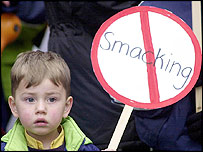
Other EU countries have banned smacking
 Other EU countries have banned smacking |
The change to the law removes the defence of "reasonable chastisement" dating back to 1860, which meant British parents could use a degree of force to discipline their children.
This stance, while similar to the law in the US, had set England and Wales apart from most European countries.
In October 2002, a UN report accused the UK government of failing to meet the obligations it made by signing the UN Convention on the Rights of the Child 13 years ago.
The document, written by the UN Committee on The Rights of The Child, said there was "deep regret" that the UK retained the defence of reasonable chastisement.
|
The committee deeply regrets that the [UK] retains the defence of 'reasonable chastisement'
UN report, October 2002 |
There are already 12 European countries which have anti-smacking legislation, with Iceland the latest to join the list earlier this year.
It is too soon to assess the impact of the change in law in Iceland.
'Psychological harm'
The last country to outlaw smacking before Iceland was Germany, in 2000, where the explicit prohibition of physical punishment against children was introduced through a civil law amendment.
EU COUNTRIES WITH SMACKING BANS
The Germans also approved a law encouraging local authorities to give parents advice on non-physical means of resolving conflicts with their kids.
BBC Berlin correspondent Ray Furlong said: "Children's charities say the change in the law can't change attitudes immediately.
"Their long-term aim is to bring about a change in mentality."
When the law came in, there was a mass campaign using celebrities and other prominent people as ambassadors to promote "non-violent child-rearing".
A detailed study found 80% of parents said their ideal would be a "violence-free upbringing", but there are no statistics to show the impact of the new laws in Germany.
Ground-breaking
The first country to ban smacking was Sweden in 1978.
Non-violent parenting practices in the country are now widely considered to be the most effective and acceptable way to bring up children, according to the NSPCC.
|
" Parents are now forbidden to make use of corporal punishments or methods that demeaned and humiliate the child."
Israeli Supreme Court ruling |
As with many of the countries where smacking is banned, commentators on the law say such legislation was introduced to educate rather then to punish parents.
Across Europe, there are few high-profile cases of parents actually being punished by legislation.
In Israel, the only non-European country to have similar legislation, smacking was effectively banned in 2000.
A landmark Supreme Court judgement stated that "parents are now forbidden to make use of corporal punishments or methods that demeaned and humiliate the child".
US opt-out
Earlier this year, the New Zealand government opted for an anti-smacking education campaign rather than implementing legislation.
Meanwhile, Canada was last year also urged by the UN to change laws which allow parents to smack their children.
A UN committee ruled that Canada, like the UK, was neglecting its obligation to the UN Convention on the Rights of the Child.
The US and Somalia remain the only countries not to have signed the convention, which routinely tells members appearing before its committee to pass laws banning smacking.
In the US, it is legal in all 50 states to smack a child "in so far as the corporal punishment does not meet the individual state's definition of child abuse".
|
HAVE YOU BEEN TO THE NEWSROOM? CLICK HERE! |